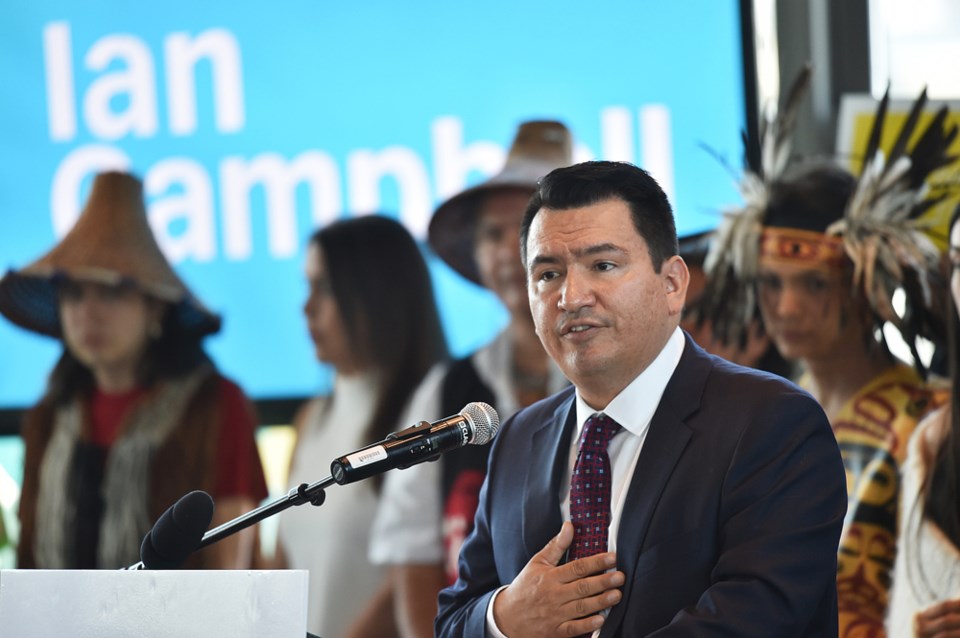A hereditary chief with the Squamish Nation and a technology entrepreneur from North Vancouver are — so far — the two contenders Vision Vancouver members will have to choose from at the party’s June 24 nomination contest.
Ian Campbell kicked off his campaign Monday while Taleeb Noormohamed has yet to make a formal announcement about his bid, although Vision insiders confirmed to the Courier Monday that he filed his nomination papers with the party.
The Courier was unable to reach Noormohamed before deadline.
Both candidates will compete to replace Mayor Gregor Robertson, who is retiring in the fall after having been Vision’s leader since he won the party’s 2008 nomination race. The party has not had a nomination race since then and has been searching for a new leader to run in the Oct. 20 election.
Campbell, 44, is a friend of Robertson’s and has surrounded himself with many of the people who worked to win three consecutive Vision majorities at city hall. Some were among the crowd of about 150 people who attended Campbell’s launch at the Waterview events centre under the Granville Street Bridge.
They included Vision’s former executive director Stepan Vdovine, Robertson’s former chief of staff Mike Magee, Vision’s former co-chairperson Maria Dobrinskaya and longtime Vision campaign veteran Clay Suddaby.
None, however, will be in charge of Campbell’s campaign.
That is being left to campaign manager Ginger Gosnell-Myers, who resigned from the city in March as aboriginal relations manager. Myers will work closely with Vision Coun. Andrea Reimer, who described her role as co-chairperson, a role she held when Robertson sought the party’s nomination in 2008.
Campbell entered the venue to singing and drumming in a procession that included members of his own nation and others from the Musqueam and Tsleil-Waututh nations. Once at the front of the room, he removed his ceremonial dress to stand in a suit at a lectern.
Standing behind him was environmental activist Tzeporah Berman, a mix of former and current Vision politicians and potential candidates, along with First Nations leaders and young people. Muslim leader Haroon Khan and housing consultant Jim O’Dea were also in the crowd.
“Today, I stand before you as a unifier, a bridge builder to offer a new and better path forward,” said Campbell, who frequently used the metaphor of a canoe and the need for Vancouverites to pull together to “reclaim our city’s great promise.”
Campbell is one of 16 hereditary chiefs with the Squamish Nation, where he currently serves as a band councillor. He’s been his nation’s cultural ambassador and negotiator for the intergovernmental relations department since 1999.
In his speech, he spoke in general terms of the need for a strong economy, addressing homelessness (he has relatives living on the street in the Downtown Eastside), seeking support for people living with addictions and mental health issues, working with the provincial and federal governments to bring affordability to Vancouver and fighting climate change, which includes stopping the Kinder Morgan pipeline project.
All of this work, he said, will be guided by the Squamish value of chenchenstway — translated in English to “lift each other up.” He switched between the Squamish language and English during his speech, which lasted about 15 minutes.
Like other mayoral and council candidates in this year’s campaign, Campbell plans to make affordability a central part of his run to win the nomination and election, saying, “I will not rest until people who work hard and play by the rules can afford to live in your Vancouver again.”
In a scrum following his speech, Campbell acknowledged his ties to a corporation established by the Squamish, Musqueam and Tsleil-Waututh nations to develop more than 120 acres of some of the most prized property in Vancouver, including the 90-acre Jericho Lands.
The three-nation entity now has the most developable land in Vancouver.
If Campbell were to be elected mayor, he said, he would have to distance himself from the MST Development Corporation as projects proceed through city hall. Asked whether any of the property should be developed into affordable housing, Campbell said:
“The MST nations are very keen at looking at working with the city to follow the regulatory process to look at mixed composition, mixed-use of these developments so that we put a dent in rental and affordability, as well as density that allows people to invest in properties and see a return on investment.”
Campbell’s launch comes the week after Burnaby-South NDP MP Kennedy Stewart announced an independent bid for mayor, becoming the second independent mayoral candidate in the race; Shauna Sylvester of Simon Fraser University’s Centre for Dialogue is the other.
Meanwhile, the Non-Partisan Association has park board commissioner John Coupar, financial analyst Glen Chernen and businessman Ken Sim vying for the party’s mayoral spot. The Green Party has yet to decide whether it will run Coun. Adriane Carr for mayor.
“Many good people are considering a run for mayor, but my leadership goes well beyond the status quo,” said Campbell in closing his speech. “It is my intention to be the first Indigenous mayor of Vancouver. We all know the city needs a new kind of leadership that creates excitement, hope and optimism.”



